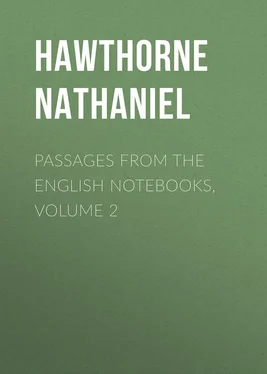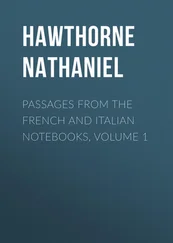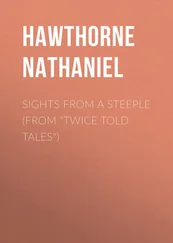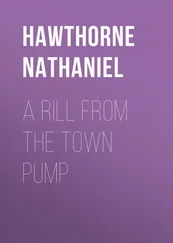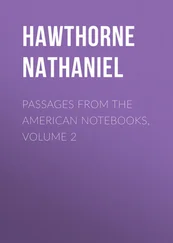Nathaniel Hawthorne - Passages from the English Notebooks, Volume 2
Здесь есть возможность читать онлайн «Nathaniel Hawthorne - Passages from the English Notebooks, Volume 2» — ознакомительный отрывок электронной книги совершенно бесплатно, а после прочтения отрывка купить полную версию. В некоторых случаях можно слушать аудио, скачать через торрент в формате fb2 и присутствует краткое содержание. Жанр: literature_19, foreign_antique, foreign_prose, на английском языке. Описание произведения, (предисловие) а так же отзывы посетителей доступны на портале библиотеки ЛибКат.
- Название:Passages from the English Notebooks, Volume 2
- Автор:
- Жанр:
- Год:неизвестен
- ISBN:нет данных
- Рейтинг книги:5 / 5. Голосов: 1
-
Избранное:Добавить в избранное
- Отзывы:
-
Ваша оценка:
- 100
- 1
- 2
- 3
- 4
- 5
Passages from the English Notebooks, Volume 2: краткое содержание, описание и аннотация
Предлагаем к чтению аннотацию, описание, краткое содержание или предисловие (зависит от того, что написал сам автор книги «Passages from the English Notebooks, Volume 2»). Если вы не нашли необходимую информацию о книге — напишите в комментариях, мы постараемся отыскать её.
Passages from the English Notebooks, Volume 2 — читать онлайн ознакомительный отрывок
Ниже представлен текст книги, разбитый по страницам. Система сохранения места последней прочитанной страницы, позволяет с удобством читать онлайн бесплатно книгу «Passages from the English Notebooks, Volume 2», без необходимости каждый раз заново искать на чём Вы остановились. Поставьте закладку, и сможете в любой момент перейти на страницу, на которой закончили чтение.
Интервал:
Закладка:
When the cathedral had sufficiently oppressed us with its beauty, we returned to sublunary matters, and went wandering about Salisbury in search of a luncheon, which we finally took in a confectioner's shop. Then we inquired hither and thither, at various livery-stables, for a conveyance to Stonehenge, and at last took a fly from the Lamb Hotel. The drive was over a turnpike for the first seven miles, over a bare, ridgy country, showing little to interest us. We passed a party of seven or eight men, in a coarse uniform dress, resembling that worn by convicts and apparently under the guardianship of a stout, authoritative, yet rather kindly-looking man with a cane. Our driver said that they were lunatics from a neighboring asylum, out for a walk.
Seven miles from Salisbury, we turned aside from the turnpike, and drove two miles across Salisbury Plain, which is an apparently boundless extent of unenclosed land, treeless and houseless. It is not exactly a plain, but a green sea of long and gentle swells and subsidences, affording views of miles upon miles to a very far horizon. We passed large flocks of sheep, with the shepherds watching them; but the dogs seemed to take most of the care of the flocks upon their own shoulders, and would scamper to turn the sheep when they inclined to stray whither they should not; and then arose a thousand-fold bleating, not unpleasant to the ear; for it did not apparently indicate any fear or discomfort on the part of the flock. The sheep and lambs are all black-faced, and have a very funny expression. As we drove over the plain (my seat was beside the driver), I saw at a distance a cluster of large gray stones, mostly standing upright, and some of them slightly inclined towards each other, – very irregular, and so far off forming no very picturesque or noteworthy spectacle. Of course I knew at once that this was
STONEHENGE,
and also knew that the reality was going to dwindle wofully within my ideal, as almost everything else does. When we reached the spot, we found a picnic-party just finishing their dinner, on one of the overthrown stones of the druidical temple; and within the sacred circle an artist was painting a wretched daub of the scene, and an old shepherd – the very Shepherd of Salisbury Plain sat erect in the centre of the ruin.
There never was a ruder thing than Stonehenge made by mortal hands. It is so very rude that it seems as if Nature and man had worked upon it with one consent, and so it is all the stranger and more impressive from its rudeness. The spectator wonders to see art and contrivance, and a regular and even somewhat intricate plan, beneath all the uncouth simplicity of this arrangement of rough stones; and certainly, whatever was the intellectual and scientific advancement of the people who built Stonehenge, no succeeding architects will ever have a right to triumph over them; for nobody's work in after times is likely to endure till it becomes a mystery as to who built it, and how, and for what purpose. Apart from the moral considerations suggested by it, Stonehenge is not very well worth seeing. Materially, it is one of the poorest of spectacles, and when complete, it must have been even less picturesque than now, – a few huge, rough stones, very imperfectly squared, standing on end, and each group of two supporting a third large stone on their tops; other stones of the same pattern overthrown and tumbled one upon another; and the whole comprised within a circuit of about a hundred feet diameter; the short, sheep-cropped grass of Salisbury Plain growing among all these uncouth bowlders. I am not sure that a misty, lowering day would not have better suited Stonehenge, as the dreary midpoint of the great, desolate, trackless plain; not literally trackless, however, for the London and Exeter Road passes within fifty yards of the ruins, and another road intersects it.
After we had been there about an hour, there came a horseman within the Druid's circle, – evidently a clerical personage by his white neckcloth, though his loose gray riding pantaloons were not quite in keeping. He looked at us rather earnestly, and at last addressed Mrs. – , and announced himself as Mr. Hinchman, – a clergyman whom she had been trying to find in Salisbury, in order to avail herself of him as a cicerone; and he had now ridden hither to meet us. He told us that the artist whom we found here could give us more information than anybody about Stonehenge; for it seems he has spent a great many years here, painting and selling his poor sketches to visitors, and also selling a book which his father wrote about the remains. This man showed, indeed, a pretty accurate, acquaintance with these old stones, and pointed out, what is thought to be the altar-stone, and told us of some relation between this stone and two other stones, and the rising of the sun at midsummer, which might indicate that Stonehenge was a temple of solar worship. He pointed out, too, to how little depth the stones were planted in the earth, insomuch that I have no doubt the American frosts would overthrow Stonehenge in a single winter; and it is wonderful that it should have stood so long, even in England. I have forgotten what else he said; but I bought one of his books, and find it a very unsatisfactory performance, being chiefly taken up with an attempt to prove these remains to be an antediluvian work, constructed, I think the author says, under the superintendence of Father Adam himself! Before our departure we were requested to write our names in the album which the artist keeps for the purpose; and he pointed out Ex-President Fillmore's autograph, and those of one or two other Americans who have been here within a short time. It is a very curious life that this artist leads, in this great solitude, and haunting Stonehenge like the ghost of a Druid; but he is a brisk little man, and very communicative on his one subject.
Mr. Hinchman rode with us over the plain, and pointed out Salisbury spire, visible close to Stonehenge. Under his guidance we returned by a different road from that which brought us thither, – and a much more delightful one. I think I never saw such continued sylvan beauty as this road showed us, passing through a good deal of woodland scenery, – fine old trees, standing each within its own space, and thus having full liberty to outspread itself, and wax strong and broad for ages, instead of being crowded, and thus stifled and emaciated, as human beings are here, and forest-trees are in America. Hedges, too, and the rich, rich verdure of England; and villages full of picturesque old houses, thatched, and ivied, or perhaps overrun with roses, – and a stately mansion in the Elizabethan style; and a quiet stream, gliding onward without a ripple from its own motion, but rippled by a large fish darting across it; and over all this scene a gentle, friendly sunshine, not ardent enough to crisp a single leaf or blade of grass. Nor must the village church be forgotten, with its square, battlemented tower, dating back to the epoch of the Normans. We called at a house where one of Mrs. – 's pupils was residing with her aunt, – a thatched house of two stories high, built in what was originally a sand-pit, but which, in the course of a good many years, has been transformed into the most delightful and homelike little nook almost that can be found in England. A thatched cottage suggests a very rude dwelling indeed; but this had a pleasant parlor and drawing-room, and chambers with lattice-windows, opening close beneath the thatched roof; and the thatch itself gives an air to the place as if it were a bird's nest, or some such simple and natural habitation. The occupants are an elderly clergyman, retired from professional duty, and his sister; and having nothing else to do, and sufficient means, they employ themselves in beautifying this sweet little retreat – planting new shrubbery, laying out new walks around it, and helping Nature to add continually another charm; and Nature is certainly a more genial playfellow in England than in my own country. She is always ready to lend her aid to any beautifying purpose.
Читать дальшеИнтервал:
Закладка:
Похожие книги на «Passages from the English Notebooks, Volume 2»
Представляем Вашему вниманию похожие книги на «Passages from the English Notebooks, Volume 2» списком для выбора. Мы отобрали схожую по названию и смыслу литературу в надежде предоставить читателям больше вариантов отыскать новые, интересные, ещё непрочитанные произведения.
Обсуждение, отзывы о книге «Passages from the English Notebooks, Volume 2» и просто собственные мнения читателей. Оставьте ваши комментарии, напишите, что Вы думаете о произведении, его смысле или главных героях. Укажите что конкретно понравилось, а что нет, и почему Вы так считаете.
